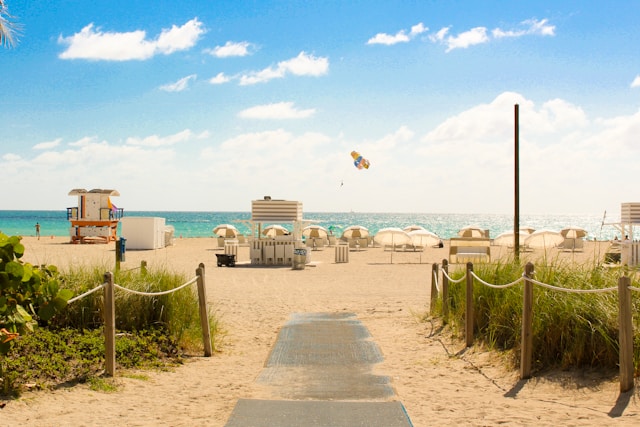Written by: Sanjin Hadziomerovic
Florida continues to be one of the top vacation destinations in the U.S., attracting millions of tourists every year. With its diverse beaches, vibrant cities, and year-round sunshine, it’s no surprise that short-term rentals — especially on platforms like Airbnb and Vrbo — are thriving across the state.
But before jumping into an Airbnb investment in Florida, understanding city-specific regulations is critical. From permit requirements to zoning restrictions, each Florida city has its own unique approach to regulating short-term rentals (STRs). Failure to comply can lead to fines, shutdowns, or legal trouble — making it essential for investors and hosts to stay informed.
In this guide, we break down short-term rental regulations in Cape Coral, Tampa, Key West, Destin, Clearwater, Jacksonville, Pensacola, and Sarasota — based entirely on the latest local data available on GetChalet.com. Whether you’re an out-of-state investor or a Florida homeowner considering converting your property into a vacation rental, this city-by-city breakdown will help you navigate the legal landscape.
Cape Coral: Permit Simplicity in a Booming Waterfront Market
Cape Coral has embraced short-term rentals, offering a relatively simple path to compliance — but hosts still need to follow the rules. All STRs must be registered with the city’s Department of Community Development, regardless of how they’re advertised (Airbnb, Vrbo, etc.). The process involves submitting a registration form, paying a fee, and undergoing an inspection to ensure the property meets all health and safety codes.
Zoning laws also apply, and investors must ensure their property is in a district that permits vacation rentals. One key point: Cape Coral does not impose overly burdensome restrictions, making it a relatively host-friendly environment in Florida’s west coast region. That said, compliance with fire safety and occupancy standards is mandatory.
Airbnb Rental Regulations Cape Coral
Tampa: Business Licensing and Zoning Awareness Are Critical
In Tampa, Airbnb and short-term rental hosts must obtain a business tax receipt and ensure their property is compliant with local zoning regulations. The city does not allow STRs everywhere, so zoning verification is crucial.
Beyond the zoning and licensing components, hosts must follow fire safety rules and building code requirements. Inspections may be required, and the city may take enforcement action for non-compliance. Since local ordinances can evolve, Tampa investors should stay current on city council decisions and check periodically with the Planning Department.
Tampa is one of the more urban markets in Florida, and as STRs become more common, regulatory scrutiny is likely to increase. But for now, if you’re willing to follow the process, Tampa remains an accessible market for short-term rental owners.
Airbnb Rental Regulations Tampa
- 📊 Which Airbnb rental markets are set to outperform in 2025 based on revenue growth, occupancy trends, and supply shifts.
- 🏡 Where home prices are still affordable while generating high rental income.
- 📈 How to identify markets with strong appreciation potential for both short-term cash flow and long-term gains.
- ⚖ Which cities have the best (and worst) STR regulations—so you don’t get caught off guard.
- 🔎 The demand trends driving guest bookings and what amenities maximize revenue in each market.

Key West: The Most Regulated Market in Florida
Key West stands out as one of the most heavily regulated Airbnb markets in Florida — and perhaps in the entire country. Operators must obtain a Vacation Rental Permit from Monroe County before listing their property. The permit includes an initial fee of $500, plus ongoing annual renewal fees.
More importantly, Key West enforces zoning with strict geographic boundaries. Some properties, like those in the historic district or residential neighborhoods, are completely barred from offering short-term stays. Properties that qualify must pass inspections and adhere to occupancy, trash collection, and parking regulations.
This is not a market for the casual or uninformed host. However, for investors with the right property in the right area, nightly rates and occupancy tend to be very strong. If you’re serious about Key West, hire a local STR attorney or property manager who understands the nuances.
Airbnb Rental Regulations Key West
Destin: Coastal Zoning and Safety Rules Shape Investment Potential
Destin is a strong short-term rental market, but the city requires hosts to comply with specific zoning and safety requirements. Not every neighborhood allows STRs, so understanding permitted zones is key.
The city mandates safety standards including the installation of smoke detectors, fire extinguishers, and general code compliance. Registration is required, and in some areas, owners must secure a local business license as well.
Destin’s local government is active in monitoring compliance, and HOAs in certain communities may impose their own restrictions. While regulation is moderate compared to other Florida markets, potential investors should be thorough when evaluating a property’s legal rental status.
Airbnb Rental Regulations Destin
Clearwater: Zoned with Precision — Know Your District
Clearwater is another Florida city with strict zoning-based STR rules. The city is divided into zoning districts that either allow or prohibit short-term rentals. The burden is on the property owner to confirm that their location is in an allowed district before operating.
Clearwater doesn’t have a citywide STR permit, but failure to comply with zoning or HOA restrictions can result in violations. Investors should also be aware of limits on the number of guests, noise ordinances, and rules around trash and parking — which may vary based on property location.
Overall, Clearwater encourages STR activity in tourist-friendly zones while tightly restricting it in traditional residential areas. For a successful Airbnb business here, local research is a must.
Airbnb Rental Regulations Clearwater
Jacksonville: Licenses, Taxes, and Quiet Oversight
In Jacksonville, STR hosts are required to obtain a business license and register for tax collection purposes. This includes collecting and remitting both sales tax and tourist development tax — key compliance areas that can trigger audits if ignored.
Compared to markets like Key West, Jacksonville’s regulation is less intense. However, all hosts must still follow zoning rules and ensure their property meets local safety codes. Jacksonville does not require a special permit for short-term rentals, but the licensing and tax obligations are enforced.
This more hands-off approach makes Jacksonville attractive to investors looking for light regulation but solid rental potential in a growing metro area.
Airbnb Rental Regulations Jacksonville
Pensacola: Definitions Matter — Especially for Taxation
Pensacola defines a short-term rental as any stay of six months or less, and all such properties must be properly permitted. Hosts are required to comply with zoning laws, which can vary by neighborhood, and must also ensure that the property meets safety codes.
Just like in other Florida markets, hosts in Pensacola are responsible for collecting and remitting sales and lodging taxes. The city has been clear that it intends to enforce compliance through tax audits and inspections.
Pensacola can be a lucrative STR market thanks to strong tourism and affordability, but it requires hosts to be diligent about the administrative and legal setup.
Airbnb Rental Regulations Pensacola
Sarasota: Registration, Tax Receipts, and Fire Safety
In Sarasota, all short-term rentals must be registered, and hosts are typically required to obtain a business tax receipt from the city. Zoning enforcement is real — many neighborhoods prohibit STRs altogether, while others allow them under specific conditions.
Sarasota prioritizes safety compliance, with hosts required to follow local building codes, fire safety regulations, and occupancy limits. These rules are enforced both at the city level and often by HOAs or condo associations.
While the regulatory process is manageable, Sarasota expects hosts to operate like legitimate businesses — and that means paperwork, inspections, and ongoing compliance.
Airbnb Rental Regulations Sarasota
Final Thoughts: Florida’s Patchwork of Airbnb Laws Requires Local Expertise
Florida is a top-tier short-term rental market, but it’s far from uniform. Regulations range from hands-off (Jacksonville) to highly restrictive (Key West), with many cities like Tampa, Destin, and Sarasota falling somewhere in between.
For Airbnb investors, success in Florida depends on more than just picking a good property — it means understanding hyper-local laws, staying compliant with registration and tax obligations, and sometimes navigating HOA rules or zoning ordinances.
Before you invest, make sure to visit the GetChalet.com Airbnb Regulation Center for up-to-date city-specific guidance — and work with professionals who know the local laws inside and out.


